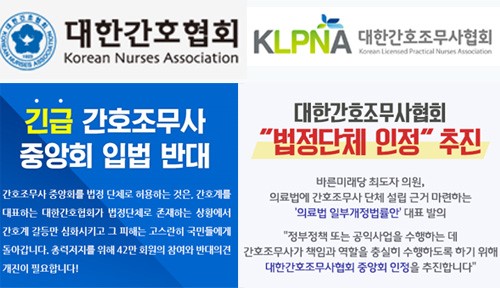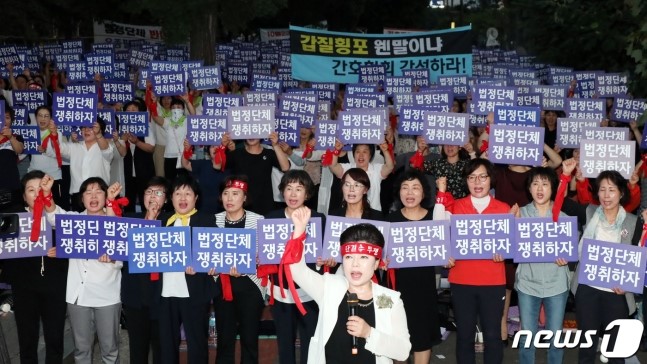In February 2019, revisions to our medical laws were brought before government. The main focus of these revisions is the recognition of the Korean Licensed Practical Nurses Association (KLPNA) as a central association. While this may seem like a simple process, the proposed revision has instead deepened the rift between nurses and nurse aides which has been on-going for a long time. In my opinion, the proposed changes should not pass.
First of all, there are no statues that enable organizations like KLPNA to be designated as a central association. Current laws only permit medical personnel to form central associations. As a result, in Korea, only doctors, nurses, dentists, midwives and Korean traditional medicine doctors can form central associations. However, nurse aides and health and medical service personnel cannot.
Of course, if this revision passes, current limitations to forming medical associations will be eliminated making it easier to recognize the group as health care providers when they are not. Many people are worried about this prospect and about 10 petitions have been circulated urging the government to “stop nurse’s aides from becoming medical personnel”. In practice, various laws regulate the work of nurse aides. If they are recognized as health care providers, the confusion would aggravate the divide between the work of a nurse’s aide and a nurse making their roles more ambiguous.
 |
| ▲ The conlfict about KNA and KLPNA's central association recognition is being worse. (Photo from Medical World News) |
In addition, should the KLPNA earn status as a national association, it will inevitably compete with the voice of the existing nurses’ association. The Korean Nurses’ Association (KNA) is currently responsible for expressing the opinions in the field of nursing. If KLPNA is recognized as a central association, both the KLPNA and the KNA will compete for a voice in the field of nursing, inevitably leading to greater conflicts between the two groups. They would both be recognized as legal and national associations giving the government little room to ignore their opinion on issues. As a result of the fractured voices, the ability to bring about effective changes in policy will weaken. The KNA said, “KLPNA’s national association recognition would split the nursing profession and the quality of nursing services will decrease.” Any slowdowns in operational improvements will negatively impact the consumer who is the beneficiary of nursing services.
After the proposed medical law revision was announced, members of the National Assembly, the existing KNA and KLPNA’s conflicts and rows worsened. In fact, the revisions haven’t even passed, but the conflicts are already worsening. If the KLPNA does earn the right to become a central association, the rift between nurses and their aides will only deepen.
The KLPNA and its supporters argue the association is a necessary vehicle for nurse aides to express their opinions. However, the fight to improve their rights and protect their interests should be separate from their hope to earn recognition as a central association. The KNA mainly represents the voice of nurses while no organizations represent that of nurse aides. As a result, nurse aides suffer from discrimination and other unfair treatment. However, becoming national association is a different issue from improving their workplace rights. Better treatment of nurse aides is needed, not another national association. The KNA admits they haven’t adequately represented the opinions of nurse aides, but have agreed to improve their efforts.
In many workplaces, nurse aides are used as an alternate to a qualified nurse because existing Health and Medical laws have not clearly defined the work domains of both professions. The KNA blames these blurred lines for creating a conflicting relationship between the groups as hospitals often confuse the roles requiring nurse aides to perform the work of nurses and vice versa. So, creating clearly defined roles should be a priority for both for nurses and nurse aides.
Despite the fact that nurse aides are being treated unfairly and their opinions are being ignored, recognition of the KLPNA’ as a national association will not help their predicament. If they want better treatment and recognition as a profession, they need to work within the existing structure of the KNA and present instead, a united voice.
Nowadays, the conflict between nurses and nurse aides is being debated. The KLPNA have argued for their recognition and their request is dividing the population. However, in my opinion, nurse aides have no basis for making a central association. If they are recognized, then the voice of two associations will exist in the same field, further fragmenting their ability to bring about change. The recognition of central association is different from a need to improve workers’ rights and advance their interests. For these reasons, I disagree with the recognition of the KLPNA as a central association.
 |
| ▲ KLPNA is protesting to get the recognition of KLPNA's central association. (Photo from News1) |
신지희 dankookherald@gmail.com

![[Campus Magnifier] Let's Surf the Library!](/news/photo/202404/12496_1765_4143.jpg) [Campus Magnifier] Let's Surf the Library!
[Campus Magnifier] Let's Surf the Library!
![[Campus Magnifier] Let's Surf the Library!](/news/thumbnail/202404/12496_1765_4143_v150.jpg)





